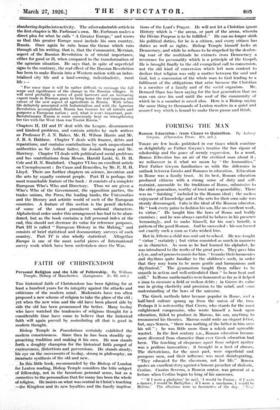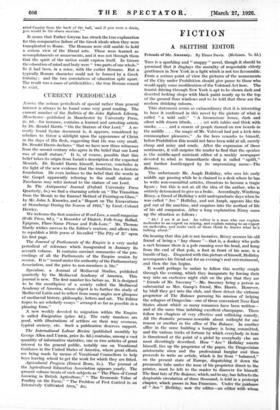FORMING THE MAN
Roman Education : from Cicero to Quintilian. By Aubrey - Gwynn. (Clarendon Press. 10s. net.).
THERE are few books published in our times which combine so delightfully as Father Gwynn's treatise the fine rigour of scholarship and the grace of seemly expression: In a word, Roman Education has an air of the civilized man about it we rediscover in it what we mean by " the humanities." First Father Gwynn familiarizes us with the difference in outlook between Greeks and Romans in education. Education in Rome was a family trust. At its best, Roman education produced citizens with a strong. sense of duty and self-
restraint, amenable to the traditions of Rome, submissive to the older generation, worthy of trust and responsibility. There • was no " finishing " included in the Roman ideal ; the useless enjoyment of knowledge and of the arts for their own sake was sternly discouraged. Cato is the ideal of the Roman educator.
He " took every pains to fashion his son, like an excellent work, .to virtue." He taught him the laws of Rome and bodily exercises-; and he was always careful to behave in his presence becomingly, and to make himself, for his son's benefit, a pattern of the good Roman. And he succeeded '; his son turned out exactly such a man as Cato wished him. _ .
But in Athens a child was sent out to school. He was taught virtue 7 certainly ; but virtue consisted as inuchin manners as in character. As soon as he had learned :his alphabet, he was introduced to the works of the great poets. They gave him a lyre, and set poems to music for him, " to make their harmonies and rhythms quite familiar to the ohildren's souls, in: order that they may leard to be more gentle and_ harnionious and rhythmical." The gymnasium taught theM ratler to be smooth in 'action andviell-articulated than " to hear heat and cold." In Rome matheniaties'were honoured as far as it helped a-men to MeaStire. afield or reckon debts ; in Greece its Value was in giving elastieity'anil precision to the . mind; and some understanding of the laws of the universe.
The Greek methods later became popular in Rome, and a half-bred culture sprang up from the union of the two.
Perhaps it is noteworthy that Cicero, who stands for the, most enlightened compromise, who wrote himself' a hook upon education, failed to produce in Marcus, his son, anything to
recommend his theories. Marcus could write an elegant letter,
but, says Seneca, " there was nothing.of the father in him save his wit " ; he was little more than a rakish and agreeable wastrel. In the first, . century A.D., Roman education became
more divorced from character than ever Greek education had been. The teaching' of eloquence apart from subject matter
was a perilous innovation ; it brought in a host of abuses. The rhetoricians; for the 'most part, were superficial and pompous men, and their influence was most disintegrating. " They educated for the classroom, not for life." 3eneca quotes an excellent story against a famous preacher of rhotorie, Cestitts. • Cassius Severus, a Roman , orator, was present at a
.
lecture when Cestius began to brag of his successes.
" If I were a gladiator,' he said, ' I would be FUSitifi ; if T worn a dancer, I would be Bathyllus ; if I were a racehorse, I would bo Melitsio.' The allusions were to favourites of the day. ;'.1'es,' cried Cassius from the back of the hall, 'and if you were a drain, you would be the cloaca maxima.' "
It seems that Father Gwynn has struck the true explanation for this comparative failure of the Greek ideals when they were transplanted to Rome. The Romans were still unable to hold a serious view of the liberal arts. These were learned as accomplishments or amusements, and it was not through them that the spirit of the nation could express itself. In Greece the education of mind and body were " two parts of one whole." So it had been, in a sense, with the earlier Romans. But a typically Roman character could not be formed by a Greek training ; and the two correlatives of education split apart. The result was a mass of artificialities ; the true Roman ceased to exist.























































 Previous page
Previous page